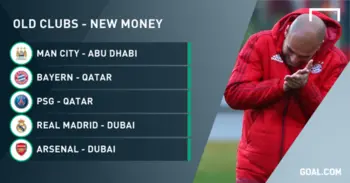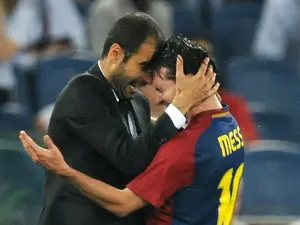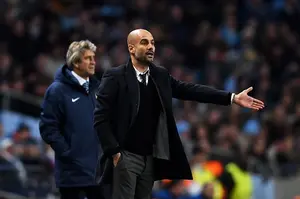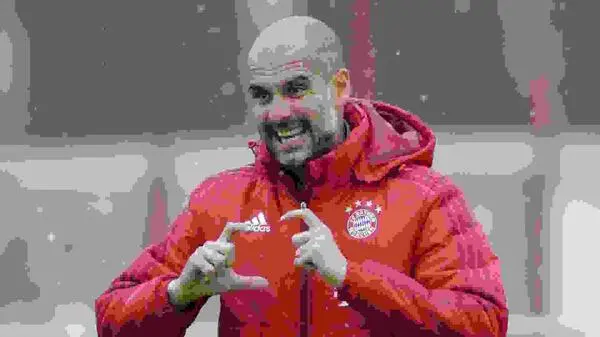The Bayern Munich boss will move light years ahead of his peers in pay terms when he takes over at Manchester City in the summer, and into the realms reserved for the best players
There is a viewpoint prevalent among fans in football’s traditional strongholds that the modern game is fallen. There are those who see themselves as real fans and who long for a time when things were simpler. Those were the days before satellite TV and Qatar 2022 when no effort for global appeal was made on the part of clubs.
There is comfort in that kind of nostalgia as it reminds people that the game they spend so much of their lives watching is exactly that; a game pure and simple.
That line of thought makes Pep Guardiola so compelling a character. He is steeped in football history; all the way back to Johan Cruyff, who spread the Total Football message to Barcelona and gave that club a template for eternity. Pep was, after all, handpicked by Cruyff to be the "pivot" of his Dream Team. On a subconscious level, being able to identify with someone so successful yet so rooted in the game’s past is both nourishing and familiar. He can be said to be a good ambassador in that respect.
His heritage has not passed unnoticed to marketers either, which gives Guardiola not only a broad popular appeal but also a bigger bank balance than any coach before him.
For example, Adidas signed Guardiola to be its Champions League ambassador in 2013 around the same time he took over as Bayern Munich coach. Pep is thought to make around €1 million a year for his contract with the sports brand on top of what he is paid by Bayern. It might seem beyond rational comprehension that a coach can earn €1m a year to stand on the sidelines in the stuff his team are contractually obliged to wear anyway.
Adidas gets no great exposure from Guardiola’s deal like it would from Lionel Messi wearing its boots. It is deeper than that. The Bayern boss has commodified his message; Adidas in turn sells it on.
“Adidas have an amazing heritage but at the same time they are also proud to be at the cutting edge of football and these are two qualities that I really admire,” Guardiola said in the press release that accompanied his signing.
Replace “Adidas have” with “I have” in the above sentence. That statement would capture perfectly why Guardiola is considered to be the only coach worth sponsoring. This type of deal and the very fact it's worth making also spells out why he is the only coach making Messi money.
Pep grew as a footballer and a coach through the years that football metamorphosed - for better or worse. He is the prime manifestation of what football is right now - with its rapacious capitalistic spirit and its contradictions included. The clubs he's worked at - Barcelona and Bayern Munich - are the type of big, traditional monoliths by which football is defined. Like Pep they straddle the divide between old values and new, emerging ones.
There would appear to be an unwritten moral charter for football, drawn up by those who would like to see it kept pure, ideal and as they like it. There is outrage because of the involvement of what is perceived to be new, dirty money in the old game - money that comes primarily from energy producers in the Middle East.
Reference is constantly made to how Qatar, for example, treats its migrant workers, the rate of deaths on construction projects; its sense of “otherness” makes traditional football people shift in their seats. Guardiola would appear to have no qualms working through those kinds of issues. He is a Qatar pioneer having first played there - being among the first ageing superstars to move out - and then acting as salesman-in-chief for the 2022 World Cup bid.
Just like Messi breaks ground on stadium projects in oil-rich Gabon and is pictured with strongman dictator Ali Bongo Ondimba, Pep pitches the World Cup for Qatar. There is no moral consideration to those decisions.
That's what top-level football is; reliant on the riches of states and individuals who want reputational cleansing in return for their money. Don’t fool yourself into thinking the traditional clubs are excluded from the equation.
Manchester City, where Pep is going, are perhaps the prime example with their Abu Dhabi investors but also Paris St-Germain, Barcelona and Bayern with their ties to Qatar. Arsenal and Real Madrid's sponsorship comes primarily from Dubai. Juventus were jumping into bed with Colonel Gaddafi at the start of the century. The money, whatever the source, must flow up to the top clubs. It’s what sustains them. And at the top clubs is where we find people like Pep Guardiola.

Guardiola will be the highest-paid football coach in history upon joining Manchester City in time for next season. The most recent estimates have him down to earn around £20m per annum at the Etihad. It can be difficult for coaches to earn the respect of players much richer than they themselves can ever hope to be, but he is redressing that balance. It helps.
From extreme wealth and Instagram to fans following players closer than clubs, there has never been an age of individualism in footballers quite like this one. Ambitions to win the Ballon d’Or now match the ambitions to win team trophies. And now more than ever the biggest clubs are stockpiling those best talents. It takes someone very capable indeed to motivate and direct a team built like that towards their goals.
It takes a forceful personality to convince those players that your ideas are worth a damn. There is a chance that a coach could be seen as a turkey by the all-star cast that has been assembled. We have seen this happen with Rafael Benitez at Real Madrid this season when confronted with the disrespect of James Rodriguez and Sergio Ramos. This has never been a problem with Guardiola for he has the perfect background of a stellar playing career - himself a European Cup winner.
There are coaches who might well get the chance at a super club until they are proven inadequate, like Benitez, but if you want your super team to grow even better then there is only one man for the job. Limitations aren’t allowed for at clubs like Barcelona or Bayern or now City. Solutions are bought. There is no excuse for failure. Clubs like that are expected to win well every week. Combined with that, such is his reputation now, Guardiola is actually expected to win a treble every season.



He deals with that pressure on a daily basis because he possesses an unshakeable belief in his own way of playing football. He trusts in his own capabilities to reinvent his team and bend his players to his will. Now the crux; his ideas require the best players.
This is why the argument of Guardiola having to prove himself at a smaller team - where he could take on a challenge - falls down so easily. Once upon a time a great manager like Brian Clough could get Nottingham Forest promoted, win the league and then two European Cups in a row. He had to do things like that in order to be considered a great manager. Super clubs didn’t exist.
It would be impossible for Guardiola to work with average players when he has spent nearly a decade coaching prestigious clubs featuring the likes of Messi, Xavi and Thomas Muller.
For City, he now guarantees prestige like Messi does on the playing side but, more than that, he could even have a strong claim to have made the Argentine the player he is. Praise for Messi is praise for him. The Barca star is the best of all time, but only because Guardiola told him what to do.
What Guardiola provides involves much more than setting out 11 men on a field. It is an interpretation of a game of football that has never been read in such a wa y before. Every match is a symphony, composed in honour of the opposition. There are the football fundamentals and there is what Pep Guardiola does.
Messi can go dribbling into gaps that his team-mates can't see, and Guardiola interprets football from another dimension. That kind of football is worth £20m a year and he's not shy about asking Abu Dhabi or Qatar for it either.
- Goal